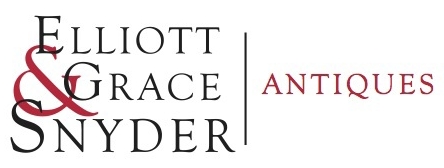A striking pair of companion portraits, probably of William and Mary, done by the Anglo-American artist John Cooper (1695-1754) working in Boston 1714-21. John Cooper, or J. Cooper as he occasionally signed his works, was the English son of London art dealer and print publisher Edward Cooper, whose prints no doubt were the source of some of his son’s paintings.
17 3/4” x 21 1/4” framed (in appropriate reproduction frames), 13 1/2” x 17” (sight).
Paintings are in very good condition with only very minor inpainting, laid on board.
For more information about J. Cooper’s sojourn in Boston, cf. Robert A. Leath, “Jean Berger’s Design Book: Huguenot Tradesmen and the Dissemination of French Baroque Style,” Chipstone 1994.
SOLD.

